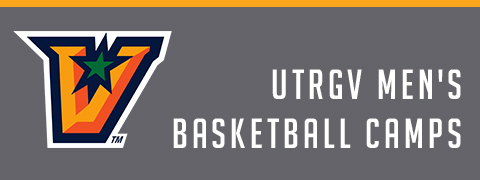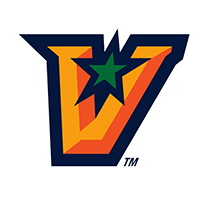Vegan Bodybuilding: Vegan Fitness Competition Diet Plan
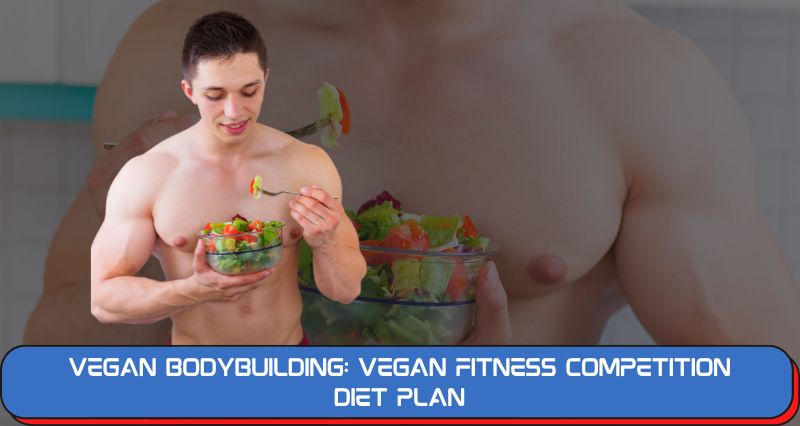
The vegan diet has grown in popularity in recent years, with an increasing number of people adopting this way of eating for its alleged health benefits and ethical concerns about animal abuse.
It has piqued the interest not just of the general public, but also of athletes, especially bodybuilders.
This article discusses the vegan diet for bodybuilding, including items to include and avoid as well as a sample 5-day meal plan.
What is a vegan bodybuilding diet?
Bodybuilders try to increase their muscles for aesthetic goals by engaging in intense resistance training.
Nutrition is important in the process of muscular development. Protein consumption should be roughly 0.7-1.0 grams per pound (1.6-2.2 grams per kg) of body weight per day in order for optimal muscle building to occur.
A calorie surplus of 10-20% is also advantageous for muscle mass gain, particularly for people who are not new to training.
Because of their high protein and calorie content, traditional bodybuilding diets incorporate a lot of animal source foods.
The vegan bodybuilding diet excludes all animal products and contains more protein than standard vegan diets.
This provides a dilemma for vegan bodybuilders because plant-based proteins are of poorer quality than animal-based proteins, which might impact muscle gain.
As a result, careful planning is required to ensure enough consumption of protein, calories, and various micronutrients that a vegan diet may lack.
The vegan bodybuilding diet also varies depending on whether a bodybuilder is in their off-season or undertaking contest preparation, when fat loss is typical.
How to implement the diet
While following a vegan diet may appear to be straightforward, it requires careful preparation to ensure that you are eating entire meals.
Many of the meals on the vegan bodybuilding diet are centered on numerous staple foods.
To begin the vegan bodybuilding diet, plan out 5-7 days of meals to ensure you have all of the components, as many vegan recipes call for multiple products.
If you’re coming from a typical diet, it may be beneficial to gradually include more vegan items into your daily diet before completely converting over.
Fill up on high protein plant foods
It’s critical to consume adequate protein when following a vegan bodybuilding diet to help you reach your muscle-building goals.
Given that many vegan protein sources do not include all of the essential amino acids, bigger amounts and a wider range of these meals are required to meet your needs on a daily basis.
Filling up on high protein vegan foods like seitan, tofu, lentils, and quinoa can help you satisfy your protein requirements and grow muscle.
Vegan protein powders can also help you achieve your protein demands by offering concentrated doses of protein before and after exercises.
Make sure to eat enough fat
Consuming enough fat offers the calories required to support muscle development because fat contains twice as many calories per gram as carbs and protein.
Off-season bodybuilders should consume 0.5 grams of fat per pound (1 gram per kg) of body weight every day.
This translates to approximately 80 grams of fat per day for a 175-pound man bodybuilder (80 kg).
When starting a vegan bodybuilding diet, it may be beneficial to track your macronutrient intake – protein, carbohydrates, and fat — for the first few weeks to verify you’re reaching your requirements.
Drink plenty of fluids
Because a vegan bodybuilding diet is high in fruits, vegetables, grains, and legumes, fiber consumption can become rather high.
Certain negative effects, such as bloating, increased flatulence, and gastrointestinal pain, might occur when you drastically increase your fiber consumption.
One approach to help prevent issues from a high fiber vegan diet is to drink enough of water. A minimum of one milliliter of fluid per calorie is a decent starting point.
If you’re following a 2,000-calorie diet, aim for 2,000 ml (68 ounces) of fluids. However, bear in mind that your water requirements may differ, especially if you’re exercising.
Educate yourself
Following a vegan diet requires education, which can distinguish between a successful and failed diet.
Because the vegan diet forbids the use of various food groups, followers are at danger of vitamin shortages.
To avoid problems, it is critical to understand which foods contain the key nutrients that the diet may otherwise lack.
Fortunately, as the vegan diet has grown in favor, educational tools have been developed to point you in the proper direction.
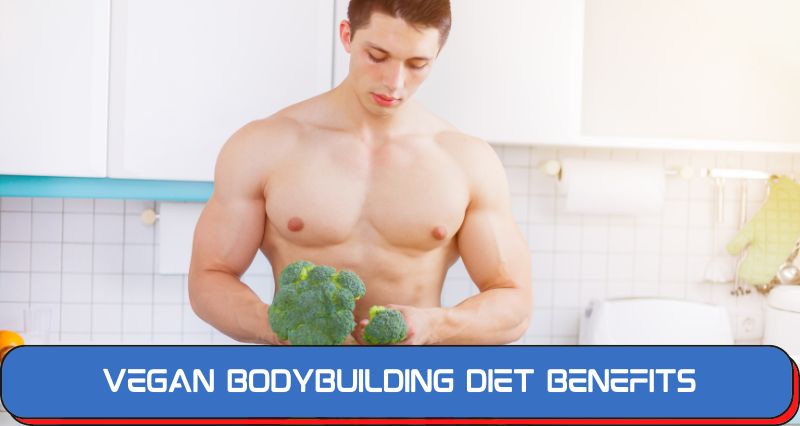
Vegan bodybuilding diet benefits
The vegan diet has been linked to a number of potential health benefits.
Reduces heart disease risk
Vegan diets appear to reduce the chance of acquiring heart disease greatly.
This may be due in part to a lower diet of saturated fats and cholesterol, as well as a higher intake of fiber and different plant components.
Vegans have historically had lower blood pressure and levels of total and LDL (bad) cholesterol than the general population.
Furthermore, the vegan bodybuilding diet is abundant in fruits and vegetables, which are high in dietary fiber. A high fiber diet has been linked to a lower risk of stroke and heart disease.
Can promote a healthy body weight
Vegans often have a lower body mass index (BMI) than those who follow a regular Western diet, which lowers the risk of various disease causes.
One 16-week study looked at the impact of a vegan diet on 75 overweight persons. It discovered that the vegan diet was more effective than a control diet at improving body weight, fat mass, and insulin resistance markers.
As a result, if you’re just starting out on your bodybuilding journey and need to reduce some weight, the vegan diet may be advantageous.
May protect against certain cancers
A vegan diet has been linked to a lower risk of different types of cancer when compared to a standard Western diet.
This benefit is most likely owing to the vegan diet’s increased legume, fruit, and vegetable intakes, which result in higher fiber, micronutrient, and phytonutrient intakes.
A vegan diet has also been linked to a lower BMI. A high BMI is yet another risk factor for certain cancers.
Furthermore, consuming more soy, which is common in vegan diets, has been linked to a lower risk of breast cancer in women.
Finally, different amounts of processed red meat consumption have been associated to an increased risk of colorectal cancer. This higher risk does not apply to people who eat a vegan diet.
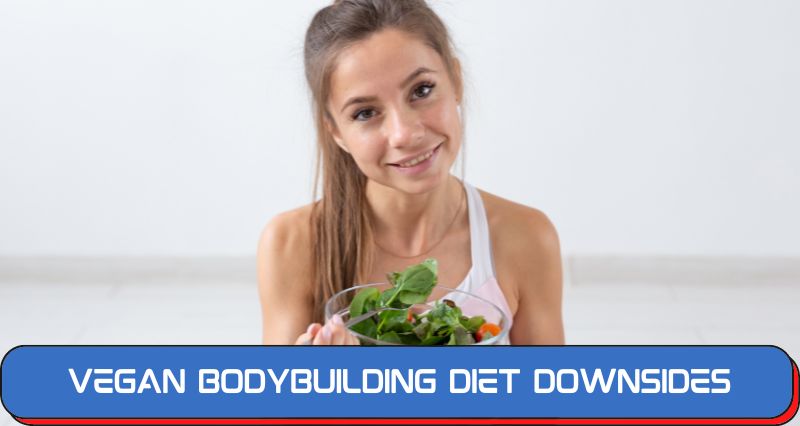
Vegan bodybuilding diet downsides
While the vegan bodybuilding diet appears to have various potential advantages, there are some drawbacks to consider.
Can increase your risk of nutrient deficiencies
The biggest disadvantage of a vegan bodybuilding diet is the greater risk of vitamin shortages.
By avoiding animal products, you lower your intake of several critical elements, including calcium, omega-3 fatty acids, iron, zinc, and vitamins B12 and D.
To guarantee adequate intake of the aforementioned nutrients, you may need to take a vegan multivitamin. Vegan omega-3 supplements, which are often derived from algae, are also available.
While these elements can be supplied through fortified vegan foods, nutrition understanding is essential when beginning a vegan diet.
Higher fiber intake
Another disadvantage of the vegan bodybuilding diet is its increased fiber intake.
While eating a lot of fiber is generally considered healthy, eating too much fiber can cause digestive troubles like bloating, frequent gas, and abdominal pain.
The recommended daily fiber consumption is 14 grams per 1,000 calories, which equates to approximately 25 grams for women and 38 grams for men. On a vegan diet, this amount is readily exceeded.
Excessive fiber consumption can also cause a feeling of fullness and a reduction in appetite. While this may be advantageous for some populations, it may stifle bodybuilding progress if adequate calories are not consumed.
Can be tough to meet protein and calorie needs
Given that a vegan bodybuilding diet consists primarily of nutrient-dense, high fiber foods, meeting protein and calorie needs may be tough without adequate planning.
Vegan diets are lower in calories than standard diets since many higher calorie, animal-based dietary items are avoided.
As a result, adopting a vegan bodybuilding diet may make it difficult to consume more calories than your body burns in order to support your bodybuilding goals.
This can be mitigated by increasing portion sizes, including healthy fats in your meals, and eating cooked vegetables rather than raw ones to lower their bulk, allowing you to consume more of them.
May be overly restrictive for some people
The vegan bodybuilding diet can be excessively restrictive for some people because it excludes all animal-derived goods.
Though the variety and availability of vegan cuisine has expanded dramatically in recent years, the diet might be perceived as somewhat repetitive when compared to the standard Western diet.
Fortunately, there are an infinite number of inventive vegan recipes that can liven up and keep the diet interesting.

